On the final day of Nevada’s legislative session on Monday, lawmakers passed a bill that would require transmission providers in the state to join a regional transmission organization by January 2030, among a host of other provisions.
The Assembly on Monday voted 32-10 to pass Senate Bill 448 by Sen. Chris Brooks (D), followed by a concurrence in the Senate on the bill’s final amendment. The Senate previously voted 21-0 in favor of the bill. (See Sweeping Nev. Energy Bill Passes Senate Unopposed.)
SB448 now heads to Gov. Steve Sisolak, who is expected to sign it.
Wide-ranging Legislation
SB448 would require transmission providers to join an RTO by January 2030 unless providers can show that they haven’t been able to find a viable RTO, or that joining an RTO wouldn’t be in the best interest of the providers or their customers.
The bill would also create a Regional Transmission Coordination Task Force to advise the governor and legislature. The panel would look at potential costs and benefits of joining an RTO, where to build transmission facilities to achieve the state’s clean energy and economic development goals, and businesses that could move to the state as a result of the state’s position in a regional wholesale electricity market.
But the wide-ranging bill goes beyond transmission.
Among its many provisions, SB448 would require NV Energy, the state’s monopoly electric utility, to develop a plan for $100 million in investments from 2022 to 2024 for a variety of electric vehicle charging programs.
The bill would address energy storage by adding storage facilities and hybrid generation-and-storage facilities to the Renewable Energy Tax Abatement Program.
SB448 would require electric utilities to align their planning process with state climate goals by showing how they could reduce their CO2 emissions by 80% compared to 2005 levels by 2030 and get to net zero by 2050.
The bill would require that at least 10% of an electric utility’s spending on energy efficiency programs go toward programs for low-income customers and historically underserved communities.
Rudy Zamora, program director of Chispa Nevada, said SB448 would help address disparities in low-income communities where there is often more air pollution. Chispa is a Latino organizing program for climate action.
“By doubling energy efficiency investments in low-income homes and ensuring at least 40% of new electric vehicle charging infrastructure is deployed in historically underserved communities, we can begin to address energy equity and climate justice,” Zamora said in a news release after the Assembly passed the bill.
Ellen Zuckerman, utility program co-director for the Southwest Energy Efficiency Project, also commended the legislature for passing SB448.
“Senate Bill 448’s passage will reduce emissions, eliminate wasteful energy use and make electric vehicles more accessible to low- and middle-income Nevadans,” Zuckerman said in a news release on Monday.
Energy Bill Support
The governor appears to support SB448. On May 13, the day it was introduced, Sisolak hosted a “virtual roundtable on energy in Nevada” during which Brooks discussed his bill.
Representatives of the Governor’s Office of Energy and Office of Economic Development expressed support for the bill during committee hearings.
The bill’s final amendment added co-sponsors to the legislation. It expanded the membership of the Regional Transmission Coordination Task Force that the bill would create to include a representative of the Nevada Indian Commission.
The amendment would also remove a portion of existing law that requires at least three-quarters of money in the state’s Renewable Energy Account be used to reduce electricity costs to certain retail customers of electric utilities. Instead, the amendment says money in the fund must be used for purposes that the director of the Office of Energy establishes by regulation.




